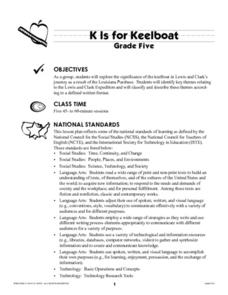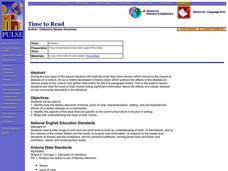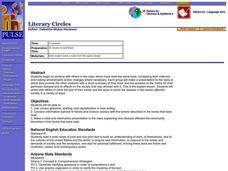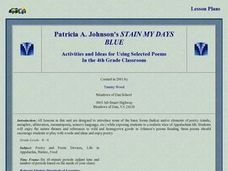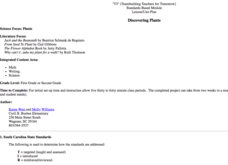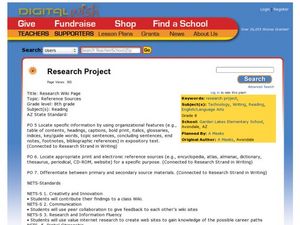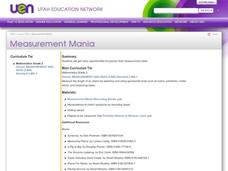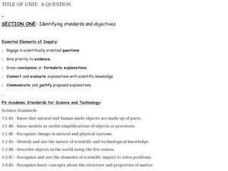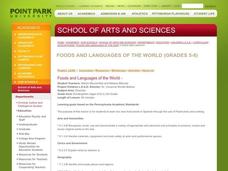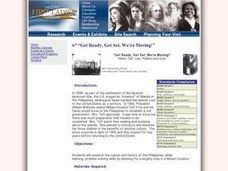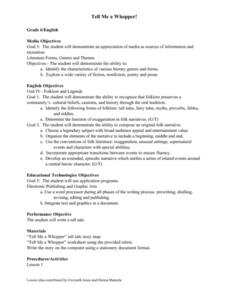Curated OER
K Is for Keelboat
Fifth graders investigate the significance of the keelboat in the Lewis and Clark expedition. They define the key themes of the expedition and classify them in prescribed format, an ABC book.
Curated OER
When Worlds Collide
Students research on a focused topic. They gather information from a range of sources and orally cit it in a presentation. Students connect information acquired in previous lessons with research on the assigned topic. They research...
Curated OER
A Man of Integrity and Courage
Students read one of the most important articles in modern medical history on the importance of conducting research in an ethical manner that includes participants who give informed consent.
Curated OER
A Sense of Place
Students identify and describe one or two places significant to them using vivid language. They describe one of those important places in accurate, evocative language showing an original perspective.
Curated OER
Language Arts: Survival Diaries
High schoolers are able to compose a dialectical journal entry which analyzes information presented in a text. They are able to compose a creative journal entry which develops characters, presents events in logical order, and includes...
Curated OER
Time to Read
High schoolers identify how the literary elements of theme, point of view, characterization, setting, and plot illustrate the effects of a certain disease on a community. They identify the aspects of the book that are specific to the...
Curated OER
Literary Circles
Students use correct grammar, spelling and capitalization in their writing. They connect information acquired in history and science classes with the events described in the books that were read. Students make a clear and informative...
Curated OER
Stain My Days Blue
Students read several poems related to the life and culture of the Appalachia region. They are introduced to the poetic forms of simile, alliteration and onomatopoeia and respond to the poems through journal entries and poetry of their own.
Curated OER
Lesson Two: Rock N Rhythm & Rhyme (Part Two)
Second graders find rhythm and rhyme in poetry. In this poetry lesson, 2nd graders listen to different poems to find the rhyming words. They play a memory game and try to find two words that rhyme.
University of Southern California
Discovering Plants
Students construct a small greenhouse and plant lima beans. They read books about plants, tend the lima bean seedlings, observe and record plant growth, taste a variety of plants and maintain plant journals.
Curated OER
Research Project
Students learn the characteristics of arachnids by researching the arachnid of their choice and producing a 4 to 5 paragraph research paper.
Curated OER
Understanding Immigration Through the Use of Triante Poetry
Third graders read a book about emigrating to America. They create and illustrate a triante poem using sensory words, depicting something they liked about the story.
Curated OER
Measurement Mania
Second graders get many opportunities to practice their measurement skills.
Curated OER
Guided Reading "In the Night Sky"
Students participate in a variety of reading exercises, such as choral reading and reading response journal, to reinforce concepts about space and nocturnal animals.
Curated OER
The Stinky Cheese Man and Other Fairly Stupid Tales
Sixth graders demonstrate the ability to process and evaluate content from a variety of sources and apply comprehension skills to the material read. They organize information for practical use and design and develop an informational...
Curated OER
A QUESTION
Young scholars engage in scientifically oriented questions. They give priority to evidence, draw conclusions/formulate explanations and connect/evaluate explanations with scientific knowledge. Students communicate and justify proposed...
Curated OER
Foods and Languages of the World
Young scholars review Mexico's location and language and learn to pronouns 10 new Spanish food words. Students listen as the book, Corn is Maize is read, touching and passing around an ear of Indian corn. Young scholars discuss the...
Curated OER
Haiku Poetry
Third graders write their own haiku poem after a lesson plan on the history and format of a haiku. In this poetry lesson plan, 3rd graders write a haiku with the correct lines and symbols.
National First Ladies' Library
Get Ready, Get Set, We're Moving!
Young scholars use the internet and other sources to research the culture and history of the Philippines. In groups, they discover why William Taft moved to the Philippines. Students participate in a scenario where they make preparations...
Curated OER
Author, Author!
Third graders, in groups, select and research a favorite studenT author or illustrator. They answer questions about the author, conduct research and prepare a PowerPoint presentation with their findings.
Curated OER
Tell Me a Whopper!
Sixth graders investigate tall tales as a literary genre. They listen to a number of tall tales to discover how exaggeration is used as a story element. They write and publish a tall tale using word processing software. They illustrate...
National First Ladies' Library
Are We There Yet?
Pupils study the wide-reaching effects of the Cold War, even to its involvement in domestic road construction. They research the National Defense Highway System (Eisenhower Highways) for information about the creation of the program, the...
ReadWriteThink
Read Write Think: Reading/writing About Whales Using Fiction and Nonfiction Texts
Students will have a whale of a good time in this lesson in which they use fiction and nonfiction texts to write a letter to an online scientist.
ReadWriteThink
Read Write Think: Comparing Fiction and Nonfiction With Little Red Riding Hood
Contains plans for nine 50-minute lessons that center around different versions of "Little Red Riding Hood." In addition to objectives and standards, this instructional plan contains links to PDF handouts and sites used in the lessons as...
